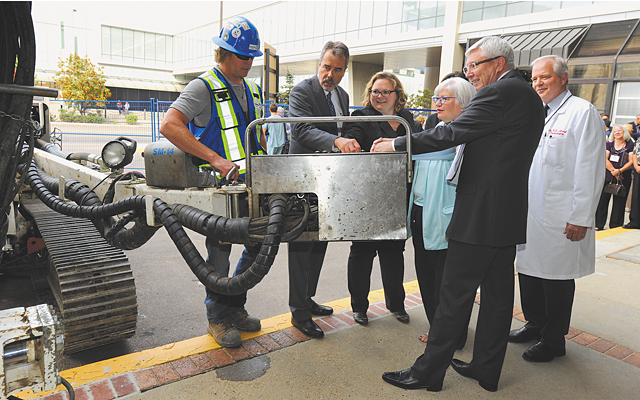Feature Story

Alberta Hospital set to acquire gamma knife, 3T MRI
September 29, 2015
EDMONTON – Alberta’s first gamma knife and clinical 3T MRI Centre – with the capability to pinpoint hard-to-reach brain tumours and perform life-saving surgery without a scalpel – will be installed at the University of Alberta Hospital.
Construction on the new Gamma Knife and Clinical 3T MRI Centre begins in October. With $17.5 million in donor support, the hospital will acquire the two medical devices that offer the most advanced, non-invasive and pain-free technology now available for treating brain-surgery patients.
“Gamma Knife radiosurgery is pain and incision-free,” said neurosurgeon Dr. Keith Aronyk, director, division of neurosurgery, University of Alberta Hospital. “There’s no operation. So there’s no anesthesia. You come in the morning and go home in the afternoon, having had the definitive treatment for many brain conditions. It’s almost miraculous.”
“Our vision for the Brain Centre has always been to provide the best doctors with the most advanced equipment,” said Jim Brown, Brain Centre Campaign co-chair with the University Hospital Foundation. “Breaking ground on the new Gamma Knife and Clinical 3T MRI Centre is the culmination of tremendous community support and a shared commitment to provide the best care possible to brain patients across northern Alberta.”
Vickie Kaminski, president and CEO of Alberta Health Services (AHS), agrees. “This project has the potential to revolutionize neurosurgery in this province and to provide new hope to individuals who need, but cannot undergo, traditional brain surgery,” said Kaminski. “This is another outstanding example of foundation dollars being invested in areas that are advancing the health system’s priorities and overall direction.”
Gamma Knife radiosurgery focuses close to 200 tiny beams of radiation on a target to treat brain tumours, malformations and movement disorders such as Parkinson’s disease.
With no need to open the skull, not only is the patient spared scalpels, general anesthetic, blood loss, infection risks and prolonged recoveries, but they typically return home the same day.
They’re back to living their regular lives within 24 to 48 hours with a noticeable difference – their debilitating headaches, terrifying seizures or life-threatening tumours are either completely gone or reduced enough for them to live a life that’s not dictated by their condition.
If a picture is worth a thousand words, then the complementary technology – a 3T MRI (magnetic resonance imaging) scanner – provides an encyclopedia of brain details for neurosurgeons. The ‘T’ stands for tesla, a unit of measurement used to quantify the strength of a magnetic field.
Twice as powerful as the more common 1.5T device, the 3T MRI scans up to four times faster, meaning patients who struggle to lie perfectly still in a confined space for long periods, such as those with movement disorders, won’t have to. 3T MRI images let neurosurgeons make more precise diagnoses and deliver more focused disease management in many therapeutic areas.
Images taken with the 3T MRI scanner have proven so crisp and clear that they have been known to pick up aneurysms in patients during routine imaging, and to also provide pinpoint guidance for delicate surgeries.
Edmontonian Brad Freeman, who had a brain tumour treated with a Gamma Knife in Winnipeg, says he’s delighted with news of the new local centre.
“Future brain care patients in Alberta are incredibly fortunate to have access to this remarkable technology,” says Freeman. “Patients in the past had to make really tough decisions on how to handle devastating brain conditions.
“With the Gamma Knife, they will receive the best treatment in the world and their lives will carry on with minimal impact,” Freeman added. “This is an exciting day for all Albertans.”
